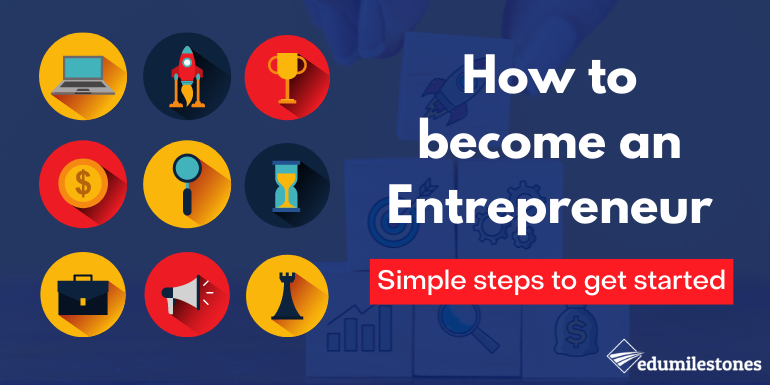It gets often said that not everyone fits in a 9-5 job. People fancy being their bosses and work accordingly. What lies ahead in that scenario? The straight answer is entrepreneurship that offers much flexibility to the people. Its validity can be figured out from already 582 million people pursuing it around the world.
The trend and numbers are likely going to spike in upcoming years. COVID-19 has pushed people hard to try every means for livelihood. Entrepreneurship addresses a variety of areas like the food industry, textile, science, and much more. Thus, ones interest can get easily fulfilled while providing job opportunities to the society.
If you are an aspiring entrepreneur, this article is suitable for you. We will walk you through the step-by-step guide to enter entrepreneurship.
Who is an Entrepreneur?
As per the definition, an entrepreneur is an individual who establishes a business, recognizes the problem, and solves it through innovative ways. The prime element is gaining monetary profits through goods or services. Some vital aspects of an entrepreneur are as follows.
- Initiator: Creativity leads the way to success for any business. Thus, an entrepreneur is always the beginning point of any idea or service.
- Leadership: We can equate an entrepreneur as the one sitting in the drivers seat. They have the complete ability to regulate and change the direction of the business model.
- Accountability: As entrepreneurs usually have the highest stakes in the venture, they are responsible for the end result or destiny of the business. Every step plays a crucial role in the overall success in any field.
Why should you become an Entrepreneur?
Now comes the question about the reason for choosing entrepreneurship among so many career options. Passion is the real driving force behind becoming a successful entrepreneur.
Some people are intimidated by the idea of taking charge in their career path. Leadership and control are indeed fascinating aspects for any individual. As per the statistics, 55% of entrepreneurs label the idea of being their own boss as the key motivation.
Other reasons behind becoming an entrepreneur include regulating destiny, unlimited earning potential, and a lasting legacy. Everyone might have a different goal before starting a venture. Be sure to identify the same and do what you cherish.
Self-employed vs Freelancer vs Entrepreneur
People are often perplexed between some key terms that get interchangeable with an entrepreneur. One of them is self-employed which means working for oneself rather than for an employer. Entrepreneurs, on the other hand, take full charge of organizing and operating a business model.
Self-employment is the first step towards moving to greater risks and ideas altogether. People generally experiment with this before organizing a venture. Another similar element is freelancing which has a way too different meaning.
Freelancers are the people who set a fixed rate for services and work accordingly to earn money. They can be content writers, graphic designers, or engaged in other fields. On the other hand, entrepreneurs work hard to organize systems and turn them into something lucrative.
What are the types of entrepreneurship?
It is vital to note that there is no single index of entrepreneurship. Everyone has different strengths to translate a vision into reality. Some individuals place economic profits as their priority while others work for social welfare.
Entrepreneurship caters to all these needs by incorporating several types in it. Here are the most prevalent forms:
- Small Business Entrepreneurship: Small scale ventures represent a majority in the business world. A vital feature about it is low capital and proximity with workers. According to the latest statistics, 1 out of 5 entrepreneurs manages a business with family members. They do not want to take a considerable risk when just entering into the industry.
- Scalable Startup Entrepreneurship: Before starting any business, everyone aims to reach the level of Google or Facebook. Such growth is only possible if people shoot for scalable ventures. A major advantage with these entrepreneurs lies in the uniqueness of the idea. They hire specialized employees to cater to the business needs accordingly.
- Large Company Entrepreneurship: Although large company entrepreneurships proportion is significantly low, they have massive popularity. Small ventures can broaden their horizons in no time. More established entrepreneurs cover a wide variety of products or services in their scope. One example is Netflix that acquired StoryBots to strengthen its relevance.
- Social Entrepreneurship: Not every entrepreneur gears up for millions of monetary profits. Some people choose to address the urgent issues that form social importance in todays era. Be it environment protection or animal rights- social entrepreneurship has got everything covered. Non-governmental organizations are the best example that works for transformative change along with financial stability.
How to become an entrepreneur step by step:
Many people often limit down entrepreneurship to attaining a specific degree. In reality, the process involves building skills and experience with time. A fixed plan is extremely vital as the failure rates are striking as well. Around two-thirds of entrepreneurs find the first year of their business to be the most challenging phase. Let us have a look at the steps that can ease everything.
1. Make a list of problems or ways to improve processes
Entrepreneurship is just a way to solve peoples problems at large. Thus, people should first start with a list of issues concerning them. You can either think about building novel technology or improving the existing processes. In the end, it is up to an entrepreneurs mind to identify what fits best for them.
2. Identify good problems
There exist a plethora of enigmas as the world gradually progresses. From cyber needs to hunger, the issues have plagued society. It is not a wise choice to incorporate everything into a business model. Instead, settle down for a lucrative idea for which people are willing to pay.
3. Know your competition
Proper research of the market beforehand can be a boon to any aspiring entrepreneur. Let us assume that you want to open a silk textile venture in a locality. Are there any present silk shops in the area? If yes, identify their products and plan the steps to succeed in the long run. It is always advisable to find the intensity, elements, and factors behind a business competition.
4. Create and test your solution
If you are already perplexed about your existing plans, try to use the SPRINT model. It is a five-day business model that includes mapping, sketching, deciding, prototyping, and test on each step. Thus, people can measure the potential success of their venture through it.
5. Know your numbers
Financing is an indispensable element of any entrepreneurship. A business owner must know about the amount required for startup along with the expected return. As it gets fixed, monetary help can get sought from friends, family, or financial institutions.
6. Register and start
The final step boils down to executing the decided business model. To register any business, you need to go to the ministry of a given area. Further actions include preparing an application and reviewing it. Get all your documents ready, and start your dream entrepreneurship!
Top 5 proven niches to start your business and scale it easily.
At any point in time, entrepreneurs must ask themselves about the features that make them stand out. Niche takes the front seat here as it is a specialized area of a much broader market. People should always be careful and choose a captivating niche that has unmet needs.
1. Career Counselling:
Career Counselling is unarguably one of the most emerging niches in the 21st century. It can get defined as a systematic practice where counsellors assist individuals in meeting occupational goals. The market size for this venture is more than INR 5,000 crore in India alone. Thus, it is an ideal choice that requires no specific degree but demands skills and passion. You can choose this path through the Certified Career Analyst program by Edumilestones from which more than 3000+ people from over 20+ countries have become Career Counsellors.
2. Digital Marketing:
Almost every sector or field takes account of advertisements or spreading awareness. As the platforms have switched to digital mode, methodologies have changed. It now incorporates marketing through digital channels such as search engines, websites, or social media. You can enrol in a course or take the help of resources to build your skill.
3. Tuition for students:
One field that holds its relevance in any circumstance is education. Do you consider yourself to be an expert in any subject? If yes, try to impart that knowledge through tuition. It will not only be flexible but fetch you bucks. You can start by teaching on your own and then hiring other educators for your institution.
4. Street food:
People often underestimate the earnings of a street food vendor. However, these people often manage to get an annual turnover of millions. It is easy to experiment with a street food business due to low start-up costs, less risk, and growing popularity. Make sure to do market research, choose a food type, and implement accordingly.
5. Health and Wellness:
As diseases keep rising, the health sector is gaining paramount importance. It is indeed significant to invest in these ventures. You can become a personal trainer, yoga expert, nutritionist, or start a brand. This niche has a high demand that requires skilled and knowledgeable experts who can help people improve their health and lead better life.
Top 5 questions about entrepreneurship answered
1. Should you quit your job?
It is not advisable to quit your job before starting a business venture. Reap the advantage of a stable income from your job and gradually move ahead. No one can estimate the success of entrepreneurship unless it is visible. Do not pressurize yourself and allow some time to grow. For instance, some of the counsellors on Edumilestones begin career counselling as a side hustle. They then gradually transition into full-time entrepreneurs.
2. Can you start a business with no money?
You do not always need millions of bucks in your pockets to become the next Jeff Bezos. However, there lies a considerable difference between a business with some capital and no capital. Resources can decrease the relevance of monetary payments. It can be in the form of intelligence, social circle, experience, or any abstract element. With no money, you can give services, sell on e-commerce platforms, or use government schemes
.
3. Should you register your startup?
Registering your entrepreneurship is compulsory to meet tax liability and carry other official processes. It also has benefits in terms of protecting a business from various legal liabilities. Further, business regulations can vary from one region to another. There is also a significant disparity among various niches. Contact your states authority and file your venture under it.
4. How to get funding for a startup?
Besides having an innovative business idea, funds form a great relevance. It is never an easy road to arrange monetary resources for any startup. Some of the top ways of doing it are:
- Crowdfunding
- Small business credit cards
- Family or friends
- Business Loans
- Picking a job
5. What to do if your startup fails?
It is okay for your business model to fail at times. After all, failure is part of tracing success. Use your experience to devise a better idea next time. According to the statistics, entrepreneurship commonly experiences these adverse situations. Do not worry much. Analyze your failure, modify your plan accordingly and keep moving ahead.
Wrapping Up
Have you ever noticed the name of Traf-O-Data? The chances are considerably low but surprisingly it was a Bill Gates company. It failed at a miserable rate when applied in action. The CEO did not take a pause there and launched Microsoft with his friend. And now, he gets counted as one of the richest people in the world.
Life is all about taking calculated risks and tracing the path all along. Having a dedicated mind and productive guidance can do wonders in the journey.
It is preferable to seek a career counsellor to identify your attributes and devise customized planning and know whether Entrepreneurship is a suitable career for you and what type of Entrepreneurship suits you well. You can check out Career Counsellor Near Me, a hub of 2,200+ Career Counsellors from across 100+ locations, ready to help you make the right career choice.
The key is to keep going despite various challenges in life. Becoming an entrepreneur is not a destination but a journey. Take a note of all vital features and strategize accordingly.
All the best, budding entrepreneurs!













